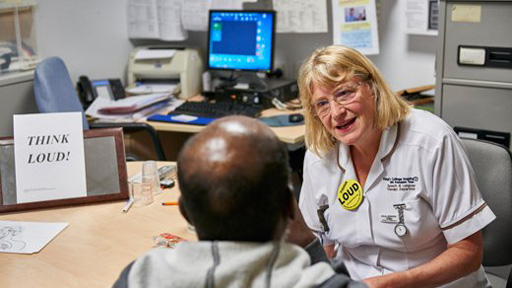4.3.3 Communication, speech and language difficulties
At end stage of Parkinson’s the individual may suffer a combination of hypophonia and dysarthria, which causes communication problems and difficulties being understood. It is important to assist the person with Parkinson’s to have an effective alternative method for communication, to lessen their frustration and allow expression of their fears or anxieties.
DYSPHAGIA
Dysphagia may be associated with an increasing risk of silent aspiration at this stage of the condition, so the speech and language therapist will educate the person with Parkinson’s and family and/or carers in how to manage this (Kaif et al, 2012).
SIALORRHEA
It is recommended that non-pharmacological intervention by the SALT is priority, but if that is not successful then glycopyrronium bromide is recommended as first line in pharmacological intervention. (Although this may not always be available.)
If treatment for drooling of saliva with glycopyrronium bromide is not effective, not tolerated or contraindicated (eg, in people with cognitive impairment, hallucinations or delusions, or a history of adverse effects following anticholinergic treatment), consider referral to a specialist service for botulinum toxin A.
Only consider anticholinergic medicines other than glycopyrronium bromide to manage drooling of saliva in people with Parkinson's if their risk of cognitive adverse effects is thought to be minimal. NICE guideline (NG71) - Parkinson’s disease in adults (2017)
Atropine eye drops can be used sublingually to ease sialorrhea with fewer side effects but only if there is a minimal risk of adverse cognitive effect and this will require regular assessment and monitoring. Oral hygiene is also an important factor in lessening distress and maintaining comfort.
4.3.2 Other types of pain

